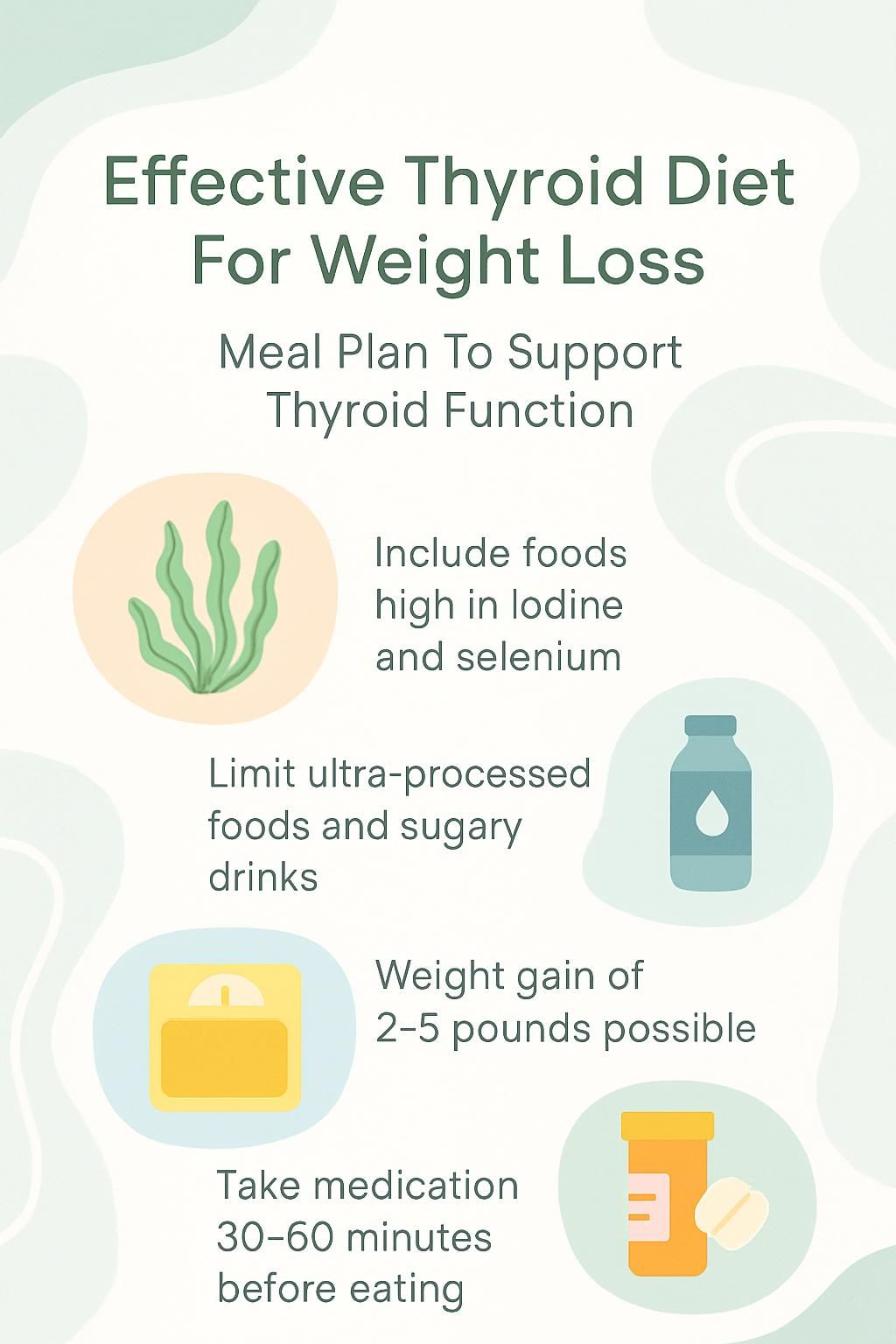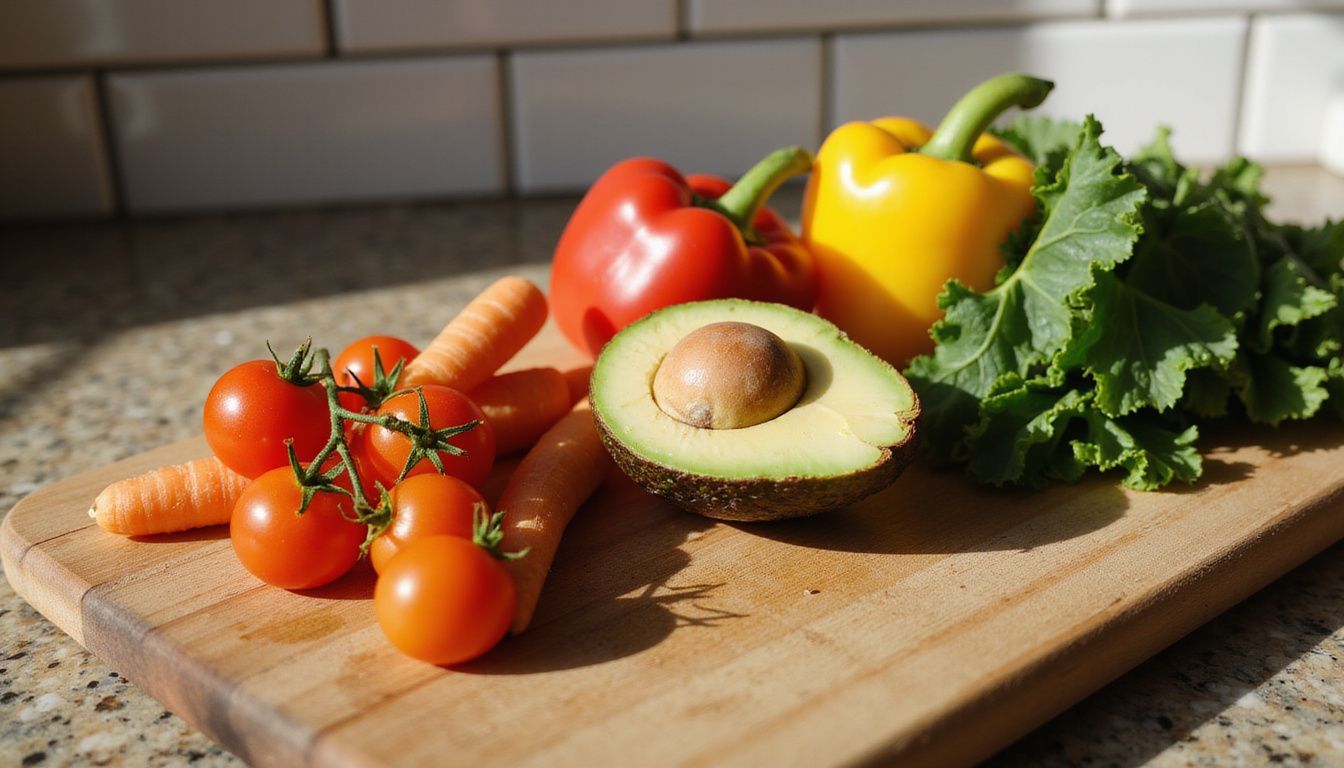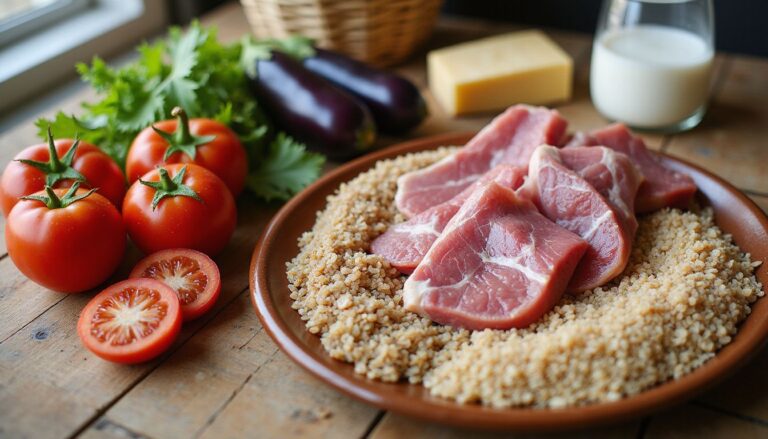Effective Thyroid Diet For Weight Loss: Meal Plan To Support Thyroid Function
Our Nutrition Assistant AI Suite will transform your body. You will lose fat, get toned, and build muscle. Gain confidence and optimal health.
If you live with an underactive thyroid, typical weight-loss advice can feel discouraging. A thoughtful hypothyroidism diet will not cure thyroid disease or replace thyroid medication, yet it can support thyroid function and make weight control more manageable.
In this guide, you will see which foods to eat and avoid, the nutrients that matter most, and how to build a simple meal plan. Small, steady changes add up.
Key Takeaways
- Prioritize foods rich in iodine, selenium, zinc, vitamin D, and omega-3 fats to support thyroid hormone production and healthy weight management.
- Limit ultra-processed foods and sugary drinks. Keep soy and large amounts of raw cruciferous vegetables in check, as advised in the NHS Eatwell Guide.
- Even mild hypothyroidism can add about 2–5 pounds, mostly from water and salt retention, according to clinical research.
- Autoimmune thyroid disease raises the risk of celiac disease. A certified gluten-free diet may help those who test positive.
- Take thyroid medication on an empty stomach, 30–60 minutes before eating or 3–4 hours after meals, since fiber and calcium can reduce absorption.

How Does the Thyroid Affect Weight Management?

The thyroid is your body’s engine controller. It sets the pace for how you use energy and influences weight gain or loss.
What Is the Function of the Thyroid Gland?
The thyroid gland makes two key hormones, T4 and T3. These thyroid hormones control metabolism, growth, and cell repair. They also help manage calcium and phosphate, nutrients that support bones, teeth, and muscles.
Your body needs iodine from food to make thyroid hormones. A healthy thyroid keeps metabolism steady. When thyroid function slows, fatigue and weight gain can follow. Mood and energy may dip as hormone levels fall.
When I was diagnosed with hypothyroidism, constant tiredness made activity feel hard. Testing and a targeted eating plan, alongside medication, helped bring my energy back.
How Does Hypothyroidism Impact Weight?
Low thyroid hormone slows your resting metabolic rate. That means fewer calories burned at rest. Studies show even mild hypothyroidism can add two to five pounds, mostly from fluid and sodium retention.
Losing weight can feel tougher, even with a healthy diet and exercise. Some people also face joint pain, fatigue, or fertility concerns, which can limit activity and daily movement.
Nutrition matters here. Low iron, selenium, or zinc can make symptoms worse by further affecting thyroid hormone production. Iron supports hormone synthesis. Low vitamin B12 can cause anemia, which drains energy.
In clients with an underactive thyroid, adding iron- and selenium-rich foods often improves energy and supports better weight control. Smart meal planning addresses these common gaps.
Essential Nutrients for Healthy Thyroid Function
Certain vitamins and minerals help the thyroid work properly. Hitting daily targets supports hormone production and can aid steady weight loss with hypothyroidism.
Why Is Iodine Important for the Thyroid?
Iodine is the raw material for thyroxine, a major thyroid hormone that drives metabolism. Most people get enough from iodized salt and a balanced diet, as outlined in the NHS Eatwell Guide.
During pregnancy, iodine needs rise to support fetal brain development. Those taking levothyroxine usually do not need extra iodine. Too much can trigger thyroid problems or worsen autoimmune activity.
Seaweed and kelp contain very high iodine. Regular large servings or supplements can harm thyroid health, especially with autoimmune thyroid disease. Using table salt and moderate dairy gave me adequate iodine without supplements.
Kelp supplements are not recommended if you have any kind of thyroid condition, says the American Thyroid Association.
Another key nutrient, selenium, also protects thyroid tissue and supports hormone activation.1
How Does Selenium Support Thyroid Health?
Selenium enables the conversion of T4 into active T3. Good sources include Brazil nuts, tuna, sardines, eggs, and legumes. Adequate selenium may calm thyroid inflammation in autoimmune thyroid disease, though large trials are still in progress.
Research suggests selenium can help mild thyroid eye disease when used for about six months. Still, more data are needed. The adult upper limit is 400 micrograms per day. Very high intakes can cause hair and nail loss, diarrhea, or other serious effects.2
Some studies show lower antibody levels in Graves’ disease with selenium, yet improvements in thyroid function are not consistent. Food first is a safer plan. Stay within safe limits.
What Role Does Zinc Play in Thyroid Function?
Zinc helps your body produce and activate T3. Low zinc can worsen fatigue, slower metabolism, and hair loss. Top sources include oysters, lean beef, chicken breast, beans, and lentils.
Small studies suggest combinations of zinc with vitamin A or selenium may support thyroid hormone levels. High-dose supplements are risky. If you supplement, separate zinc from levothyroxine by at least four hours so medication absorbs well.
Work with a registered dietitian if you suspect a zinc shortfall. Evidence is still limited, so personalization is helpful.
How Does Vitamin D Affect the Thyroid?
Vitamin D helps regulate calcium and phosphate, which protect muscles and bones. Low vitamin D levels are common in hypothyroidism and autoimmune thyroid disorders. Deficiency links to higher odds of Hashimoto’s thyroiditis.
Doctors often check vitamin D with a blood test, especially in people with limited sun exposure. The NHS advises 10 micrograms daily for at-risk groups during autumn and winter. A supplement is often the easiest way to meet needs when sunlight is scarce.
Why Are Omega-3 Fatty Acids Beneficial for Thyroid Health?
Omega-3 fats help lower inflammation, which is common in autoimmune thyroid disease. Eat salmon, sardines, shellfish, walnuts, chia seeds, or flaxseeds. These foods can reduce oxidative stress and support hormone balance.
A Mediterranean-style pattern, with more fish, nuts, seeds, and fewer processed foods, fits well. Some people notice better energy and clearer thinking after raising their omega-3 intake. I felt fewer sluggish afternoons after adding tuna and avocado several times a week.
Omega-3s also support heart health, important because hypothyroidism can raise cholesterol.
What Foods Should You Eat to Support Thyroid Health?
Aim for nutrient-dense foods that protect hormone balance and support steady energy. Variety matters more than perfection.
Are Leafy Greens and Cruciferous Vegetables Good for Thyroid?
Leafy greens like spinach and kale supply magnesium and antioxidants. Cruciferous vegetables such as broccoli, cauliflower, bok choy, cabbage, and Brussels sprouts contain goitrogens, compounds that can interfere with thyroid hormone production at very high intakes.
Moderate portions are safe for most people, especially if you take thyroid medication on an empty stomach. Cooking these vegetables reduces their goitrogen content.
The NHS Eatwell Guide encourages plenty of vegetables for fiber and gut health. Eating cooked kale several times per week did not change my medication dose, and my digestion felt more regular.
Why Choose Lean Proteins for Thyroid Support?
Lean proteins support muscle, which keeps metabolism higher. Choose fish, shellfish, eggs, turkey, and chicken. Fish and shellfish provide omega-3s and selenium that help hormone balance.
Beans, lentils, dairy or dairy alternatives, red meat, poultry, and eggs add zinc and iron for hormone production. Keeping muscle mass matters for people with hypothyroidism. Protein helps preserve it while losing weight.
The NHS Eatwell Guide lists these as healthy protein options. Carnitine from red meat has been explored for hyperthyroidism symptoms but does not treat hypothyroidism.
How Do Nuts and Seeds Benefit Thyroid Function?
Brazil nuts are rich in selenium. One or two per day usually meet needs without risk of excess. Almonds, cashews, and macadamias supply magnesium and zinc. Pumpkin seeds provide minerals that support hormone production.
Flaxseeds and walnuts offer plant omega-3 fats. Including nut butters can raise healthy fat intake and steady blood sugar. Choose unsalted nuts and rotate types for a broader nutrient mix.
What Fruits and Berries Help Thyroid Health?
Berries such as blueberries, strawberries, and raspberries deliver antioxidants and vitamin C for immune support. Apples, citrus fruits, grapes, peaches, pears, pineapple, and bananas also fit well.
These fruits are low in goitrogens and can be part of breakfast, snacks, or dessert. Following five portions of fruit and vegetables daily helped my energy and eased constipation, a common concern with hypothyroidism.
Are Whole Grains Helpful for Thyroid Support?
Whole grains like brown rice, oats, and quinoa provide fiber for gut health and longer-lasting energy. B vitamins in whole grains support metabolism, which helps when you want to lose weight or maintain it.
High-fiber foods can affect medication absorption. Time your levothyroxine away from fiber-rich meals. Those with celiac disease or gluten sensitivity should choose certified gluten-free grains. A dietitian can help you build a plan that meets your needs.
Which Foods Should Be Avoided for Thyroid Health?
Certain choices can interfere with thyroid function or make weight control harder. Cutting back can help you feel better and keep thyroid levels steadier.
Why Avoid Ultra-Processed Foods?
Ultra-processed foods such as soda, chips, candy bars, and packaged snacks tend to raise inflammation and oxidative stress. They crowd out nutrient-dense foods that aid thyroid function.
Diets high in processed items are linked to higher rates of obesity and diabetes. For people with hypothyroidism, that can add to weight challenges. These foods are usually low in selenium, zinc, and magnesium, which are important for thyroid health.
The NHS Eatwell Guide suggests limiting processed foods and added sugar. Base your meals on whole foods instead.
How Do Sugary Drinks and Snacks Affect the Thyroid?
Sugary beverages and sweets can raise inflammation and stress on the body. They also add calories without useful nutrients and often displace healthier options.
Regular intake can lead to weight gain, which can feel especially stubborn with low thyroid levels. Reducing sugary items supports more stable energy and better appetite control.
Should People with Thyroid Issues Avoid Gluten?
People with autoimmune thyroid disease have a higher risk of celiac disease. Studies estimate 2% to 8% of these patients also have celiac.
If you have celiac disease or proven gluten sensitivity, gluten can harm the gut lining and reduce absorption of nutrients and medication. A certified gluten-free diet, using options like brown rice, quinoa, and gluten-free oats, may ease symptoms.
Not everyone with thyroid disease needs to avoid gluten. Test before changing your diet. I felt less bloated after switching to certified gluten-free grains with guidance from a dietitian.
What Are the Risks of Excessive Soy Products?
Large amounts of soy can act as goitrogens. They can impair iodine use and may reduce thyroid hormone production, especially if iodine intake is low. Highly processed soy proteins have a stronger effect than whole soy foods.
Soy can also reduce levothyroxine absorption. Keep a four-hour window between your medication and soy intake. During my own treatment, limiting processed soy helped keep my thyroid-stimulating hormone within range.
Which Foods Are High in Goitrogens and Why Avoid Them?
Cruciferous vegetables like cabbage, cauliflower, kale, bok choy, Brussels sprouts, and Russian kale contain goitrogens. Soy foods and pearl millet do as well. Kelp is also a concern due to its very high iodine content.
Goitrogens can lower hormone production when eaten in large amounts, especially if iodine intake is low. Cooking lowers their impact. Most people with balanced diets do not need to avoid these vegetables entirely.
If you take thyroid medication, eat goitrogenic foods at a different time than your dose. Lightly steaming broccoli worked well for me, while raw versions felt harsher on my stomach.
Next, build a day of meals that fit your needs and your schedule.
Sample Meal Plan to Support Thyroid Function and Weight Loss
Simple, repeatable meals help you stay consistent. Rotate ideas through the week and prep ahead when possible.
What Is a Good Breakfast for Thyroid Health?
Scrambled eggs with gluten-free toast and fresh berries offer protein, healthy fats, and fiber. Oatmeal topped with banana and pumpkin seeds is another easy choice.
Yogurt, dairy or non-dairy, adds protein. Coconut milk can help if you are sensitive to cow’s milk. Avoid high-fiber breakfasts within 30 minutes of taking your thyroid medication, since absorption can drop.
Skip sugary cereals and pastries. They spike blood sugar and leave you hungry soon after.
What Are Healthy Snack Options for Thyroid Support?
Greek yogurt with berries gives protein plus antioxidants. Pumpkin seeds supply zinc and magnesium for muscle and hormone support.
Almonds, cashews, or a small number of Brazil nuts provide healthy fats and selenium. Nut butters on sliced fruit or whole-grain crackers balance carbs and protein.
Hummus with crunchy vegetables raises fiber while avoiding ultra-processed snacks. If you use supplements, plan snacks so they do not compete with your medication.
What Should You Eat for Lunch to Support Your Thyroid?
Build a bowl with grilled chicken or salmon over spinach or kale. Add quinoa or brown rice for fiber and steady energy. Colorful vegetables such as bell peppers, carrots, and cucumbers add vitamins and minerals.
Stir in olive oil or sliced avocado for healthy fats. A sprinkle of nuts or seeds adds zinc and selenium. If you tolerate dairy, yogurt or a few cheese cubes can boost protein and calcium.
Avoid processed meats and heavy sauces. If you are gluten sensitive, swap grains for chickpeas or extra vegetables. Time lunch a few hours after your medication.
What Are Nutritious Snack Choices for Thyroid Function?
Fresh fruit like apple slices or grapes delivers fiber and quick energy. Two Brazil nuts can meet daily selenium needs for many adults.
Pumpkin seeds offer zinc. Pair raw veggies with hummus or a yogurt dip for protein. Plain Greek yogurt with berries and chopped walnuts brings protein, omega-3 fats, and antioxidants.
Trail mix with unsweetened dried fruit works in a pinch. If your snack is high in calcium or iron, wait at least 30 minutes after taking medication. That timing helped stabilize my lab results over time.
What Makes a Balanced Dinner for Thyroid and Weight Loss?
Choose a lean protein such as salmon, turkey, or chicken. Add a whole grain like brown rice or quinoa for fullness. Load half your plate with non-starchy vegetables such as broccoli, spinach, or bell peppers.
Cook with olive oil and include avocado if you want more healthy fats. Dairy can add calcium if you tolerate it. Steer clear of fried and ultra-processed options.
If you take medication at night, eat dinner 3 to 4 hours earlier. Use gluten-free grains if gluten causes symptoms. A registered dietitian can refine the plan to your needs.
How Can You Manage Weight Effectively with Thyroid Issues?
Food choices, timing, movement, and stress care all influence weight when thyroid hormone runs low. Think progress, not perfection.
Why Focus on Anti-Inflammatory Foods?
Mediterranean and plant-forward patterns ease inflammation with fish, nuts, seeds, fruits, and leafy vegetables. These foods deliver omega-3 fats and antioxidants that reduce stress on thyroid tissue.
The NHS Eatwell Guide advises limiting processed items and sugary drinks. After replacing packaged meals with whole grains, berries, and lean proteins, my energy improved within weeks.
A diverse gut microbiome thrives on variety and fiber, which supports healthy thyroid function and steadier mood.
How to Balance Macronutrients for Thyroid Health?
Build plates with lean protein, healthy fats, and complex carbohydrates. Examples include chicken, fish, eggs, olive oil, avocados, nuts, brown rice, and quinoa.
Adults need at least 0.36 grams of protein per pound of body weight, and some people with hypothyroidism do better with more. Avoid very low protein or high sugar intake, which can slow metabolism and increase cravings.
Adjust your ratios if you feel tired or if weight loss stalls. A registered dietitian can tailor macros to your energy needs and thyroid goals.
When Should You Plan Your Meals for Best Results?
Medication timing matters. Take levothyroxine on an empty stomach, 30–60 minutes before breakfast or 3–4 hours after your last meal. Keep calcium, iron, and high-fiber foods away from your dose for several hours.
Set regular meal times to steady energy and appetite. Align meals with your daily routine. An early alarm helped me take my pill on time and eat a calm breakfast afterward.
How Important Is Staying Hydrated for Thyroid Function?
Fluids support digestion, metabolism, and the transport of nutrients like iodine and selenium. The NHS suggests 6 to 8 glasses daily from water, unsweetened tea or coffee, or sparkling water.
Better hydration can ease constipation and fatigue, common with hypothyroidism. Increase fluids if you exercise often or live in a hot climate.
How Does Exercise Support Thyroid Function and Weight Loss?
Movement raises energy, protects muscle, and supports a healthy metabolism. Think of exercise as a helpful partner to your meal plan.
Why Is Strength Training Important for Thyroid Health?
Strength training builds and protects muscle tissue. More muscle raises metabolic rate and helps you burn more calories at rest. This can make weight control easier with thyroid disease.
Resistance work improves hormone balance and energy use. Many people notice less fatigue and a higher quality of life after adding two or three sessions per week.
How Does Cardiovascular Exercise Boost Metabolism?
Cardio workouts such as brisk walking, cycling, or swimming raise your heart rate and energy burn. Calorie use stays elevated for hours after a session.
Regular cardio supports better insulin sensitivity and overall metabolic health. For those managing hypothyroidism, it can help reduce body fat while supporting hormone balance.
How Can Yoga and Stress Reduction Help Thyroid Function?
High stress raises cortisol, which can disrupt thyroid hormones. Yoga, breathing exercises, and mindfulness lower tension and may steady hormone rhythms.
Gentle routines can improve sleep and mood. I noticed deeper sleep and steadier mornings after adding short yoga sessions and simple breathing drills.
What Are Common Mistakes in a Thyroid Diet?
Some habits unintentionally slow progress. Avoid these pitfalls to support your thyroid and weight goals.
Why Is Over-Restricting Calories a Problem?
Very low calorie intake increases the risk of nutrient gaps. Shortfalls in iodine, selenium, and zinc can reduce thyroid hormone production and slow metabolism further.
Severe restriction often triggers fatigue and plateaus. I tried strict fasting once and felt exhausted, then regained weight after stopping. Balanced meals work better and are easier to maintain.
How Does Ignoring Nutrient Deficiencies Affect Thyroid?
Low iodine, iron, selenium, or vitamin D can worsen hypothyroid symptoms and weaken metabolism. Hair loss, brain fog, and slow weight loss can follow.
I had uneven energy when iron intake dropped. Adding leafy greens, eggs, and legumes helped within weeks. Deficiencies also make it harder to fine-tune medication, since your body needs these nutrients to use hormones well.
Support with omega-3 fats, zinc, vitamin D, and enough protein. Aim for a colorful, whole-food pattern to cover the bases.
What Are the Risks of Taking Supplements Without Guidance?
Self-prescribing supplements can backfire. High iodine or selenium can disturb thyroid hormones or interact with levothyroxine. Timing matters too, since calcium, iron, and some herbal products can reduce medication absorption.
During early treatment, turmeric capsules gave me headaches and muddied my routine. A health professional can guide safe doses, timing, and whether you need a supplement at all.
When Should You Consult a Healthcare Professional?
Professional guidance can help you spot nutrient gaps, adjust medication, and refine your plan. Support matters, especially if symptoms persist.
What to Do If You Experience Persistent Weight Gain?
Unexplained weight gain can signal that thyroid hormone levels are off. Ask your clinician for thyroid function tests. Regular follow-ups help track changes and guide treatment.
Focus on iodine, selenium, zinc, vitamin D, and omega-3s. Cut ultra-processed foods and sugary snacks. A registered dietitian helped me spot hidden gaps and build meals that worked for my schedule.
How to Recognize Symptoms of Nutritional Deficiencies?
Deficiencies can amplify hypothyroid symptoms. Watch for fatigue, brain fog, hair or nail changes, dry skin, numbness or tingling, and muscle weakness. Low vitamin D can cause bone or joint aches. Low B12 can affect memory and nerves.
A food log and blood tests can confirm concerns. My iron and B12 levels ran low last year, and raising them resolved headaches and tiredness. Early testing prevents small issues from growing.
When to Adjust Thyroid Medication Based on Diet?
Big diet changes can affect medication needs. Adding more fiber, calcium, or iron, or starting a gluten-free or dairy-free plan, may change absorption.
Always take levothyroxine on an empty stomach. Wait at least 30 minutes before eating, and keep calcium or iron several hours away from your dose. If you shift your routine, ask your clinician whether dose changes are needed. I needed a small adjustment after moving to a high-fiber breakfast.
Conclusion
Supporting your thyroid with a smart meal plan can make weight management feel more achievable. Focus on foods rich in iodine, selenium, zinc, vitamin D, and omega-3 fats. Build meals with lean proteins, colorful produce, nuts, seeds, and whole grains. Limit ultra-processed foods and added sugar. Time high-fiber meals, calcium, and iron away from your thyroid medication.
Check with your healthcare provider before major diet changes or adding supplements. Pair steady nutrition with movement and stress care. These steps reinforce healthy thyroid function and help you work toward your weight goals.1–3Brief sources for credibility: American Thyroid Association on iodine and kelp [1]; NHS Eatwell Guide for balanced eating and hydration [2]; NIH Office of Dietary Supplements on selenium safety limits [3].
FAQs
1. How does stress (biology) affect thyroid function and weight loss?
Stress, as defined in biology, can disrupt hormone balance. This disruption may lower thyroid hormone production, which can slow metabolism and make weight loss harder. Studies show that chronic stress increases cortisol levels, which can interfere with how the body uses thyroid hormones.
2. What foods support healthy thyroid function for weight management?
Foods rich in iodine, selenium, and zinc help maintain normal thyroid activity. Examples include seaweed for iodine; Brazil nuts for selenium; and beef or pumpkin seeds for zinc. A balanced intake of these nutrients supports efficient metabolism and helps manage body weight.
3. Can a meal plan focused on reducing stress improve thyroid health?
A structured meal plan with regular meals containing whole grains, lean proteins, fruits, vegetables, and healthy fats can reduce biological stress responses. Consistent eating patterns stabilize blood sugar levels and may ease strain on the endocrine system including the thyroid gland.
4. Is there evidence linking diet quality to improved outcomes in people with low thyroid activity under chronic stress (biology)?
Research indicates that individuals who follow nutrient-dense diets experience better energy regulation even when exposed to ongoing biological stressors. Diets high in antioxidants from colorful produce also protect cells from damage caused by oxidative stress linked to poor thyroid performance.
Summary: Stress affects how well the thyroid works by altering hormone levels needed for metabolism. Eating foods high in key minerals like iodine or selenium supports this gland’s function while managing calorie intake aids weight control. Evidence-based meal plans that focus on nutrition quality help counteract negative effects of chronic biological stress on both metabolic rate and overall wellness.







